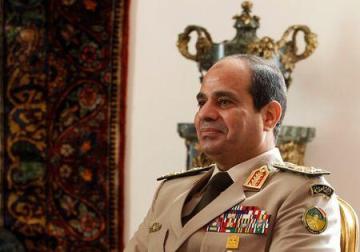Egyptian president calls for promoting agricultural cooperation with Sudan
July 12, 2015 (KHARTOUM) – The Egyptian president Abdel-Fatah al-Sisi has called for transforming the Arab Food Security Initiative (AFSI) to a concrete reality through cooperation between Sudan and Egypt in the domains of agriculture and animal wealth.

The meeting was also attended by Sudan’s ambassador to Cairo, Abdel-Mahmoud Abdel-Halim, and Egypt’s ministers of agriculture and irrigation, Salah Hilal and Hossam Mughazi.
The SEAIC was established 40 years ago when Egypt’s former president, Anwar al-Sadat, and Sudan’s former president, Jaafar Nimeir, signed the integration agreement between the two countries including establishment of an agricultural company in Ed-Damazin in the Blue Nile state.
Abdel-Halim pointed that al-Sisi met with the Sudanese delegation within the framework of his follow-up on the conduct of relations between the two countries, adding the SEAIC general assembly meeting discussed ways for promoting financial, technical and administrative capacities of the company besides the cropping pattern and preparations for the farming season.
He stressed that the meeting achieved major breakthroughs and made excellent preparations for the higher committee meeting which will be held in Cairo under the chairmanship of Bashir and president Sisi.
The Sudanese ambassador pointed that the delegation also met with Egypt’s prime minister, Ibrahim Mahlab, who underscored his country’s full commitment to promote and deepen relations with Sudan in all domains.
It should be mentioned that the total agricultural land owned by the SEAIC has diminished from 250,000 to 90,000 acres due to the armed conflict in the Blue Nile where the Sudanese army has been fighting the rebel Sudan People’s Liberation Movement/North (SPLM-N) since 2011.
Large size of the SEAIC’s land was set-aside and much of its equipments have been looted, moreover, significant part of the company has been transferred to Sudan Sudan’s territory following secession of the latter in 2011.
The last general assembly meeting of SEAIC was held in 2007.
Last April, Sudan hosted the agriculture ministers from Egypt and Saudi Arabia for discussions on a proposal made by president al-Bashir to Arab nations on using his country’s vast fertile lands to achieve Arab food security.
Once hoped to be the breadbasket of the Arab world, Sudan’s agricultural sector has continued to deteriorate over the years mainly as a result of negligence, drought, mismanagement, high taxes and the overall economic climate.
(ST)
